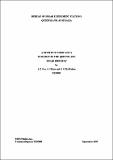| Abstract | Increasing levels of sodium on the clay, in the absence of high levels of soluble salts, are not believed to be toxic to the cane plant. Any adverse effect on crop production is through deterioration of the soil structure (Crema, 1994). Under wet conditions, increased clay dispersion accompanies increasing exchangeable sodium percentage (ESP). This is associated with sealing and crusting in surface soils and dense subsurface clays which resist penetration of roots. Even if water does penetrate the surface, it is held very strongly in the very small pores formed in the dispersed soil. It is difficult for roots to withdraw this moisture. The end result of sodicity is similar to that of salinity, water stress. Both infiltration and water storage are adversely affected. Reclamation of sodic soils can be achieved by application of gypsum or lime to promote replacement of sodium on the clay particles by calcium, and hence improve soil structure. Research work indicates that sugarcane yields on sodic soils with ESP less than 25 can be improved by up to 20% with the application of gypsum 10t/ha (Ham etal., 1995). Improvements in yield can also be achieved by improving surface and subsurface drainage to promote leaching of displaced sodium salts from the soil profile. Reduction of natural slope from 0.49% to 0.07% has also improved sugarcane yield by 24% over the crop cycle (Ham etal.,1995). Research has developed ways of increasing production on sodic soils. With the expansion of the cane industry into marginal areas there has been associated extension campaign, concentrating on farm planning and demonstrating the benefits of applied gypsum (Ham etal., 1995). A good example of this is the Burdekin where the BSES program on sodic soils is estimated to have resulted in an extra 26,000 tonnes of cane to the Burdekin district in 1994 alone with a gross value to the industry of $1.02m. |

